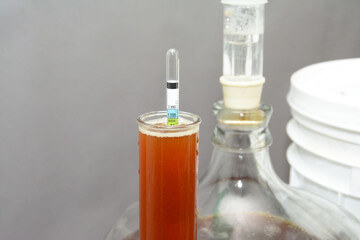Starting and Finishing Gravity for Distilling Spirits
Distilling spirits is a process that involves converting sugars and other organic compounds into alcohol. One of the most important aspects of this process is controlling the starting gravity (SG) and finishing gravity (FG) of the fermentation mixture. In this blog, we will discuss what SG and FG are and why they are important for distilling spirits.
What is Starting Gravity (SG)?
Starting gravity (SG) is a measure of the amount of fermentable sugars in a mixture before fermentation begins. In other words, it is the density of the mixture at the beginning of the fermentation process. SG is measured using a hydrometer, which is a tool that measures the density of a liquid relative to water.
Why is Starting Gravity (SG) Important for Distilling Spirits?
Starting gravity (SG) is important for distilling spirits because it affects the amount of alcohol that can be produced during fermentation. The higher the starting gravity, the more fermentable sugars there are in the mixture, and the more alcohol that can be produced. However, if the starting gravity is too high, the yeast may not be able to convert all of the sugar into alcohol, which can result in a sweet or cloying taste in the final product.
What is Finishing Gravity (FG)?
Finishing gravity (FG) is a measure of the amount of residual sugar in a mixture after fermentation is complete. In other words, it is the density of the mixture at the end of the fermentation process. FG is also measured using a hydrometer.
Why is Finishing Gravity (FG) Important for Distilling Spirits?
Finishing gravity (FG) is important for distilling spirits because it affects the flavor and alcohol content of the final product. If the FG is too high, there will be too much residual sugar in the mixture, which can result in a sweet or cloying taste. On the other hand, if the FG is too low, the alcohol content of the final product may be too high, which can be dangerous to consume.
What Should the Starting Gravity (SG) and Finishing Gravity (FG) Be for Distilling Spirits?
The ideal starting gravity (SG) and finishing gravity (FG) for distilling spirits depend on the type of spirit being produced. In general, the SG for most spirits should be between 1.040 and 1.090, and the FG should be between 0.990 and 1.010.
For example, the SG for whiskey should be between 1.050 and 1.070, and the FG should be between 0.990 and 1.010. For rum, the SG should be between 1.070 and 1.090, and the FG should be between 0.990 and 1.020. For vodka, the SG should be between 1.060 and 1.080, and the FG should be between 0.990 and 1.000.
It is important to note that these are just general guidelines, and the ideal SG and FG may vary depending on the specific recipe and fermentation conditions. It is also important to carefully monitor the SG and FG throughout the fermentation process to ensure that the final product has the desired flavor and alcohol content.
In conclusion, starting gravity (SG) and finishing gravity (FG) are important for distilling spirits because they affect the amount of alcohol produced during fermentation and the flavour and alcohol content of the final product. The ideal SG and FG for distilling spirits depend on the type of spirit being produced, and it is important to carefully monitor these parameters throughout the fermentation process to ensure a high-quality final product.




